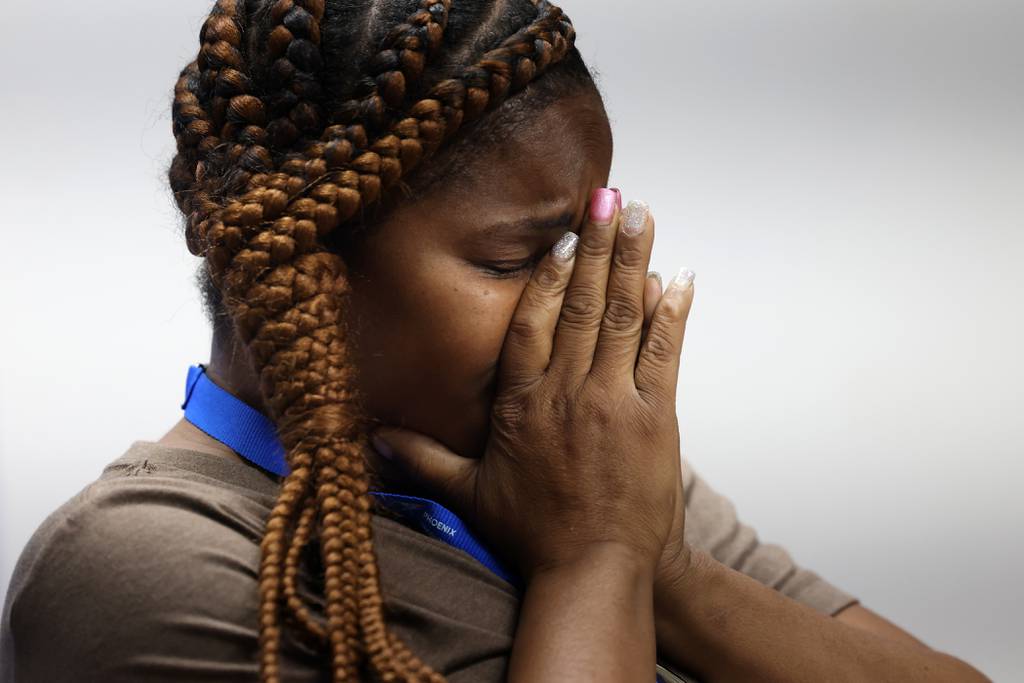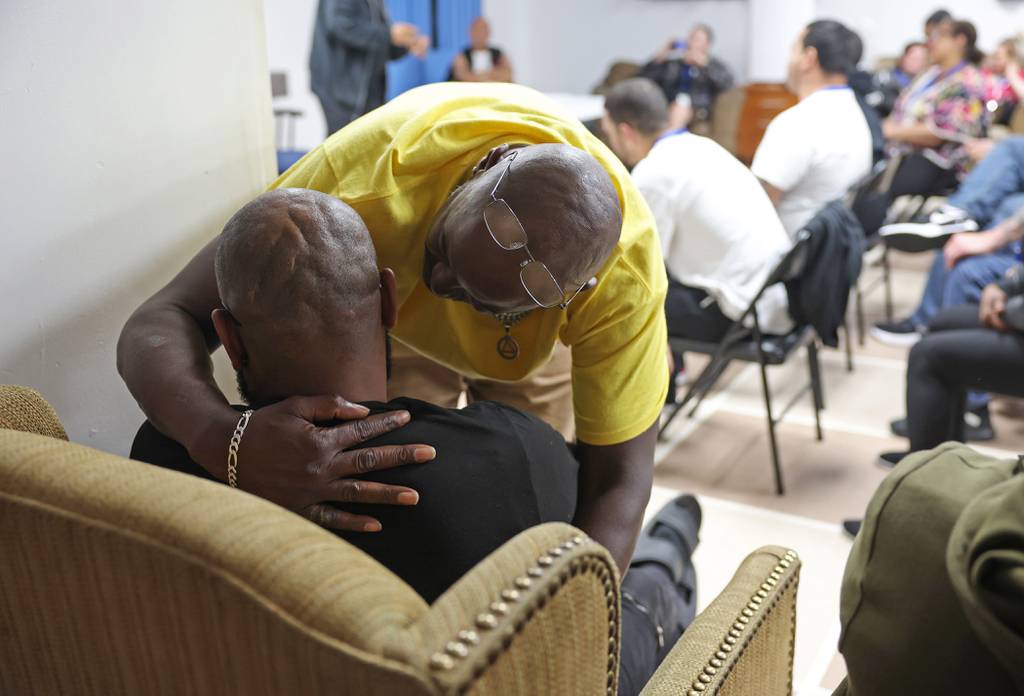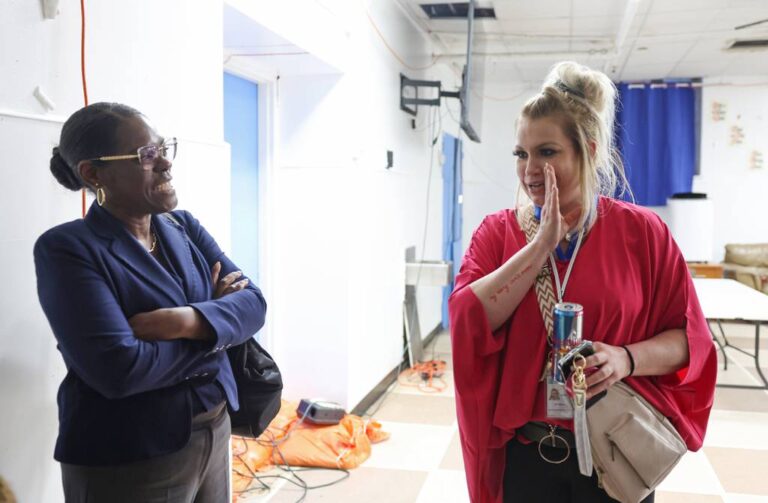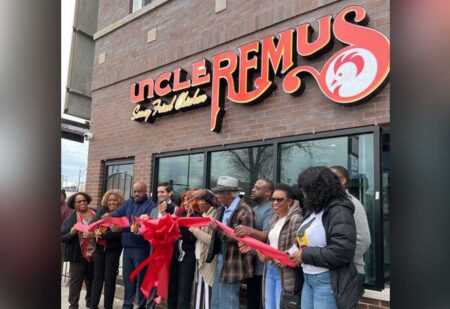Heather Beaubien doesn’t believe in rock bottom.
Not when she dropped her son off at school in the morning and stopped at a liquor store five minutes later. Not during the moments she’d dig through clothing drawers for stashed drugs and liquor and light up with a Christmas-morning feeling upon finding it. And not when she went for months without a proper shower and found herself crawling naked to let the cops in at the door of her own home.
No matter how deep she sank into addiction, it was the recovery community that helped her find her way out. After decades of alcohol and opioid addiction, Beaubien said her life changed permanently when she finally got tired of digging, but also tired of hiding.
Now, as a resident at Phoenix Recovery Support Services and addiction and recovery support counselor at Family Guidance Centers, Beaubien doesn’t hide anything. She’s one of the lucky few in recovery who has been able to get residential treatment in Chicago, as many people in her situation aren’t housed because of a lack of insurance, insufficient government-supplied beds and space — and stigma, which disproportionately affects women.
“The stigma is huge and it’s a shame. A lot of it has to do with funding. There’s not enough funding. People still don’t believe this stuff is a disease,” she said. “It’s exhausting to hide who you are and what you’ve been through. And there’s no reason to feel ashamed.”
Traditionally, individuals affected by past drug epidemics have been overwhelmingly male, said Andrew Kolodny, medical director for the Opioid Policy Research Collaborative at Brandeis University. But in the past quarter-century, those who developed an opioid addiction mostly started on prescription opioids, he said, and there is now a more even split between genders.
“Once you have this even split, you need to increase your capacity to treat women. And so despite the fact that this current epidemic began 25 years ago, we’re still playing catch-up and we still don’t have adequate treatment resources for women,” said Kolodny.
The standard of care for opioid use disorder is to at least assess if people need residential treatment, said Lindsay Allen, a professor of emergency medicine at Northwestern University’s Feinberg School of Medicine who recently published a study about the use of residential opioid use disorder treatment among Medicaid enrollees in nine states.
The American Society for Addiction Medicine has an established criteria to determine the most appropriate treatment path for a person’s needs, strengths and support system, among other variables. But just 7.5% of Medicaid enrollees with opioid use disorder receive residential treatment, Allen’s study shows.
State mental health agency expenditure per capita in Illinois is in the bottom 20% of all states, according to data from the Substance Abuse and Mental Health Services Administration. Women bear the brunt of this lack of support, said Allen.
Following the closure of The Women’s Treatment Center in the West Loop about two years ago, support from Phoenix Recovery, a residential home offering services to people with diagnosed substance misuse issues, is filling a large gap in recovery home care in Chicago.
Phoenix Recovery currently provides recovery home support to 30 women and 65 men. Residents attend outpatient programming and in-house groups, 12-step meetings, life skills training, financial literacy and more, according to Hernandez. They stay for up to a year, or as long as is necessary to get on their feet, start working and transition into their own housing.
“We definitely get a lot more calls from men than women,” said Vauna Hernandez, executive director of Phoenix Recovery.
She has been through recovery herself, she said, but for years she wouldn’t talk about it.
Hernandez sat on a wooden chair to the side of a routine Tuesday night “Recovery Education Meeting” at Phoenix Recovery in early June and clapped and laughed as residents stood up to share. She has a professional demeanor, and wore her hair slicked back into a bun, a blue blazer and dress flats.
“People who are in recovery look just like everybody else. There is no difference. We pay taxes, we vote, we’re involved in our communities,” she said.
Phoenix Recovery accepts residents of all kinds, including those on medications for opioid use disorder, or MOUD, previously referred to as medication-assisted treatment, according to Kolodny. MOUD is defined by the Centers for Disease Control and Prevention as treatment with the use of methadone, buprenorphine or naltrexone, in combination with counseling without medication.
Kolodny said that while MOUD has garnered a lot more support than it did when it was originally introduced, there are still many residential treatment programs across the country that don’t admit people who use the combination of FDA-approved drugs with behavioral therapy.
“We take people who are on it and there is no difference to us with MAR (medication-assisted recovery) than it is with diabetes medication or high blood pressure medication. It is medication,” said Hernandez.
Thirty-two of the 95 Phoenix Recovery residents use MOUD, 15 of whom are women. Even though she condones it, she still advises residents to avoid talking about their medication, she said.
“It’s nobody’s business. We don’t run around talking about how many milligrams of insulin we take. Right? So why should you be talking about the medication your doctor prescribed for your recovery?” she said.
Beaubien isn’t on MOUD herself, but said it helps many people who have been using for years stay comfortable. It’s for survival and maintenance of the treatment of the disease, she said.
“Because once you have the disease, it doesn’t not go away,” she said. “Your body is chemically and physically changed forever. It’s changed. It’s like having congestive heart failure.”
At the recovery education meeting, Phoenix Recovery residents gathered in the fluorescently lit basement of a large brick building in Austin recounting their recovery processes — shaking, crying, laughing. Of all different ages and backgrounds, people shared how many kids were in their families, their goals, breakthrough moments and career aspirations.
Their messages of vulnerability were met with roaring applause and encouragement from other residents at the house.
“Last week, I lost my best friend. Thursday, which I hadn’t shared, I lost my brother,” said resident Sherri Burdine through tears, pressing her hands together and putting them to her forehead.
Murmurs came from the crowd.
“It’s OK, Sherri, we got you,” residents said. “God has got you, Sherri.”

Allen from Northwestern said substance use disorder can affect women throughout their journey as mothers.
“Women tend to keep their drug use private, for a whole bunch of reasons — cultural and practical,” Allen said. “They’re fearful their kids will be taken from them.”
Service chief of inpatient addiction medicine at PCC Community Wellness Center Dr. Ruchi Fitzgerald works with other addiction medicine specialists to provide hospital-based addiction medicine treatment to medically underserved populations on the West Side of Chicago, including older adults and pregnant and postpartum persons with substance use disorders.
“(Fitzgerald) is dealing with these women who are afraid to come in,” said Hernandez.
Fitzgerald is well-versed in the legal and child care welfare system, and helps women create family care plans for “at-birth crises” — situations where the Illinois Department of Children and Family Services can be called due to a patient’s substance use during pregnancy.
“There’s no question about it, this population — pregnant and parenting — is the most stigmatized and shunned population,” Fitzgerald said. “They’re often using alone, and they’re very fearful.”
Fitzgerald said the federal and state governments should prioritize programs that allow mothers to access treatment with their children, and allow them to have evidence-based treatment and prenatal care with access to a long-term recovery home. The rise in fentanyl, xylazine and stimulants has only increased the need for services for pregnant and postpartum women who are at high risk of maternal mortality, she said.
“There are a paucity of resources available for pregnant and postpartum patients, especially those who live in poverty, who have substance use disorder and are involved in the child welfare system — despite the fact that Illinois law is supposed to prioritize pregnant and postpartum women for substance use disorder treatment,” she said.
Peer doula Michelle Kavouras at PCC has lived experience having a child while using substances and said it was “just horrific how (she) was treated and not provided resources.” She works with people who are pregnant and using to demonstrate what resources might be helpful, and to be an advocate for them during their pregnancy journey, birth journey and postpartum journey.
She makes sure they understand all their options for care. There is a team of specialists that help them get connected to partners in the community to find the best possible outcome for them and their family, she said.
“Unfortunately, a lot of people who come to us are unhoused,” Kavouras said.
Fitzgerald worked with statewide organizations on proposed legislation that would have repealed punitive policies affecting pregnant and parenting individuals with a substance use disorder, but the bill never made it out of committee this session despite support from multiple agencies across the state including DCFS and the Illinois Collaboration on Youth.
“A punitive approach must end and we must use our federal and state dollars allocated for our children and families appropriately — for treatment, prevention and for services; not for separation. Otherwise we will continue to see rising rates of homelessness in women, children, rising foster care rates and rising maternal mortality rates due to drug overdose,” said state Rep. La Shawn Ford, a Democrat from Chicago who sponsored the bill.
Beaubien said addiction is different for everyone, never-ending, hour to hour.
She has a light red tattoo on her forearm that reads “My story isn’t over yet,” and wore a lace cardigan with and balanced sunglasses on her temple.
“Women are supposed to carry themselves in society in a certain way. People don’t realize that women can experience addiction just as bad, if not worse,” she said.
She said she wished she had registered for residential treatment years earlier, when her son, Brodie, was 3 or 4.
“God, I would have saved so much time,” she said. “The worst thing you could steal from anyone is time.”
Just because she’s not taking a pill or having a drink now, she said, doesn’t mean she’s not still exhibiting addictive behavior, scrolling on Amazon marketplace or running to Whole Foods after work to buy a pint of ice cream.
She glowed when she talked about son Brodie, who’s nearly 11, but recalled his fourth birthday party at a waterpark when she experienced serious withdrawal symptoms and started seizing.
“I feel like the ultimate loser mom. I haven’t seen my kid since April of last year, since I got myself stuck up here in recovery,” she said.
Beaubien has been sober for about two years, she said. She’s been at Phoenix Recovery almost a year.

Hernandez said the best part of her job is seeing residents transform. Sometimes they show her mug shots of what they looked like before they went into recovery and they look unrecognizable from the people they are today, she said. Many arrive without a birth certificate, Social Security card or ID.
But Phoenix Recovery has only 100 beds and an extensive waiting list, even though the cost to house someone in a recovery home is less than the costs of repeated hospital stays from overdoses and treatments, Hernandez said.
“We just can’t house everybody,” she said. “There aren’t enough recovery homes.”
Patrick Love, who led the recovery education meeting, repeatedly thanked the government funds Phoenix Recovery received to make the meeting possible.
Beaubien sat on a couch against the wall, her head cocked slightly to the side.
“It’s like family. We love, we hate, we fight. It’s like having a ton of brothers and sisters. We have to be resilient,” she said.
Love paced as he spoke to the crowd. Some residents in the audience took notes as he spoke. Some wiped tears from the corners of their eyes.
“Be consistent with it. Are you familiar with the dance of life? Two steps forward, one step back,” Love said.
He stepped forward and back on the gray tiled floor.







